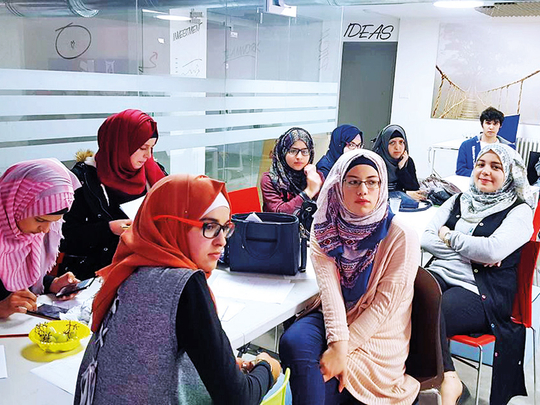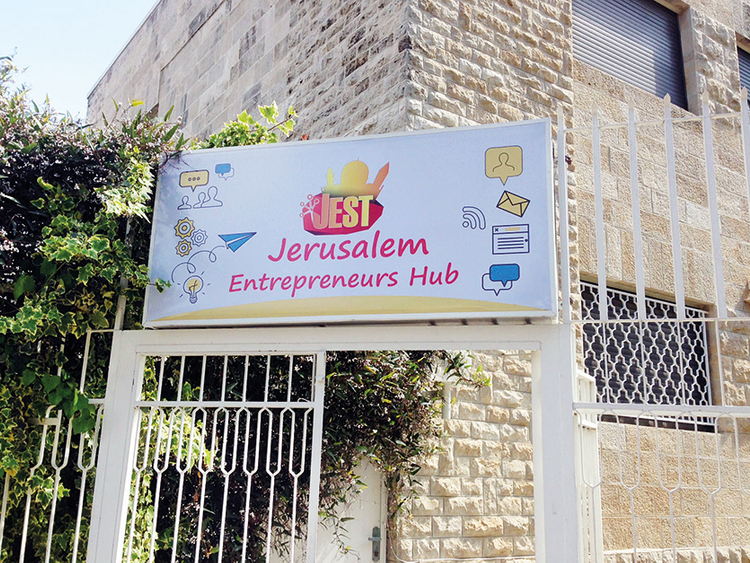
Tucked away in a basement off Nablus Road, in the neighbourhood of Shaikh Jarrah in occupied East Jerusalem is JEST (Jerusalem Entrepreneurs for Society and Technology) the first and by far only technology hub and accelerator – it is where I meet with Hani Alami, founder and chairman and his partner and co-founder Rateb H. Rabi, to learn about this non-governmental organisation that has planted the seeds from which an entrepreneurial community may eventually grow.
Alami enthusiastically says: “We began this project to try and stop the ‘brain drain’ which is generally heading to Ramallah, the Middle East and Europe. Specifically, the issue is Ramallah, as the only opportunities for Jerusalem entrepreneurs is there. They set up their businesses there, get married there and in the end, Jerusalem has lost them forever. All our talent has left this city, and in the last 10 years no new businesses in any field, besides food and grocery shops, has opened. This was our main challenge.
“Two years ago, we invited graduates from all the local universities for coffee and discussions and by our seventh meeting, we had 150 [people] registered with us. That is when we asked the question why not Jerusalem and learned that four barriers restricted us. Firstly, space is a huge problem, it is limited and very expensive. So, we obtained this basement in a deal with the landlord who is part-sponsoring us. Secondly, we found that there is a gap between our graduates’ skills and market demands. So, we set up this place to close the gap between soft skills and professional skills with training and workshops. Thirdly, networking – especially the lack of it – hindered our young entrepreneurs as there was no one to help them, they got to the market themselves. So, we began teaching them to sell their ideas in less than a minute, as they have just ‘one shot’ and soon we began to take them to international events and bring internationals to them. Lastly, an ecosystem for entrepreneurs was lacking in Jerusalem. So, by bringing potential entrepreneurs together with their stories around food, we developed a certain chemistry.”
JEST is a registered NGO in Israel and Alami says: “It was a big challenge and after support from the US State Department and CISCO, stressing the fact that we have no political agenda, only support for economic empowerment, we obtained small grants 18 months ago, to start this project.”
On a lighter note, Alami points out: “The name came about when people kept telling us to stop jesting, it won’t happen and we were determined to be the first jesters.”
On a more serious note, Rabi adds, “East Jerusalem has the highest unemployment rate in Palestine and especially amongst women, although they are highly educated. Men go to work in Ramallah but the women stay at home as the Israeli checkpoint systems and cultural constraints deter them from leaving Jerusalem. To date, 1,300 services have benefited from JEST and of that more than 70 per cent have been women. Only last week, 33 start-ups graduated and they were all women with investable ideas that have great potential.”
Adjacent to where we were talking a digital marketing class was in progress and most participants were women, which Alami points out to me.
What does JEST provide for East Jerusalem entrepreneurs?
Alami explains: “Office space with 24-hour access, internet and tea/coffee availability; business events like start-up weekends, hackathons, etc.; capacity building programmes related to business plans, digital marketing and soft skills; meetups with the public to help raise awareness of their ideas; mentorships with successful persons to provide financial, legal and technical support to entrepreneurs; networking opportunities with business leaders and national and international investors as well as connections with possible partners.”
In the short time that JEST has been operational, are there any success stories to write about?
Alami says: “Two weeks ago, there was an event in Kufuor Kasem, the first tech meet-up for start-ups from the Arab communities from Nazareth, Haifa, Jaffa etc. and we had 26 start-ups from East Jerusalem, the biggest group. So just in 18 months we have already created an ecosystem for East Jerusalem start-ups.”
“Some of them were automated educational games; smart glasses to keep drivers awake; and application for business cards; mobile applications about all services in Jerusalem; a mobile application for automation of the ISO process; IT solutions for companies by a women’s team; an online store for selling new designs with Palestinian embroidery; and outsourcing and energy solutions for the developing world.”
“My Pink Electronics - a woman-led start-up that employs women in Jerusalem and offers services that vary from developing websites for businesses to selling online, fixing mobile devices and installing computer and telecommunication networks, the start-up is headed by Abeer Ala Edein.”
“There is no commitment, no equity required and everything is almost free. We are working on a compass to have all in one site, it makes it easier to market them and export their ideas and products.”
Talking about tangible success stories, Alami excitedly explains: “NIMD, is non-invasive medical devices, Dr Anan Kupti and Dr Butros Hallaq, two PhD’s in physics worked for INTEL in Israel and the US, quit and left high salaries to work on their idea to cure cancer tumours by using nano cells to heat them up until they burns the infected cells, without harming the non-infected cells. Two months ago, they started tests on animals with great results. And now they are seeking investors for the second phase.”
“Imagery, which started in Jerusalem and then moved to Haifa, developed techniques to read pictures. And Google is thinking of buying this start-up. It is a machine learning start-up that has developed a visual recognition engine that can be embedded in any device.”
“UB Cards: Hafeth Zughayer was seriously thinking of leaving East Jerusalem for the United States. Now he teaches at JEST. After intensive incubation, his is a success story. It’s a green solution that will save paper and instead of printing business cards their platform allows you to turn your business cards into digital cards managed and is controlled seamlessly by your mobile number.”
Now he mentors and inspires others and he even won second prize at Intel Challenge ME an Internet of Things Competition that featured the participation of 70 projects from Arab countries, Zughayer and his start-up came second.
All said and done, I walk away knowing that East Jerusalem finally has an entrepreneurial hub with an active community supported by JEST and, in a matter of time, the talent here may not only replicate the success of Ramallah but could even surpass it.
Rafique Gangat, author of Bending the Rules, is based in Occupied Jerusalem.













